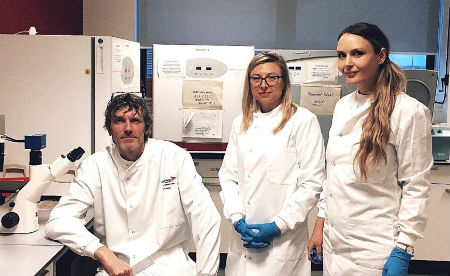Fetal life needs to be ‘just right’ to reduce the risks of developing adult illnesses
Excessive exposure in the womb to hormones called androgens can predispose to ill health among males in later life, new research has found.
Tests on male sheep - an established research model - who were exposed to excess testosterone (an androgen) during development showed high levels of cholesterol in their bloodstream by puberty and early indicators of future liver disease. The work models common human clinical conditions where excess androgen exposure occurs during in utero life.
The study – by scientists from Edinburgh Napier, Aberdeen and Edinburgh universities, funded by the Medical Research Council - reinforces earlier work demonstrating the impact of the prenatal environment on lifelong health, and is the first evidence that excess androgen exposure can negatively affect male metabolic health.
The research supports the notion that androgens are in terms of fetal development “Goldilocks” agents – if exposure is not “just right” it can adversely affect health in later life.

This work adds to growing evidence about the setting of lifelong disease risk beginning before birth. It also takes us closer to being able to identify those at risk by finding disease markers in the blood before they get ill, sheds light on why some treatments may be less effective in some individuals, and offers new targets for therapeutic development.
Study lead Professor Mick Rae, Research Fellow Dr Kasia Siemienowicz and PhD student Jennifer Thomas recently presented this work at a number of international conferences, and the work has been invited for presentation at the forthcoming World Congress of Reproductive Biology in Beijing. The full article can be viewed here at nature.com
Exposure to excess androgens, as can occur in medical conditions where the mum produces too much androgenic steroids, is associated with altered reproductive and metabolic function in daughters. The most well-known example of this is the common Polycystic ovary syndrome.
However, women with conditions such as PCOS also have sons. With the focus on daughters and development of fertility-related issues, there have only been a few studies of sons, all of which indicate that lipid metabolism is altered, culminating in increased incidence of high cholesterol.
The new study highlighted the reduced efficiency of liver processing functions in the young male sheep at the centre of the research. The liver plays major roles in the body, such as fat processing, toxin processing and gut function.
Importantly, the work found alterations in the liver prior to symptoms of ill health, and has thus shed light upon the initial stages of the journey towards chronic ill health.
The research group is now working to understand how the mechanisms affected by excess androgen exposure are altered, and how sex-specific this is.
If we can better understand the impact of the in utero environment on lifelong health, if we can identify the mechanisms involved, and if we can identify those most at risk by finding ‘future disease’ markers in the bloodstream before they get ill, we stand a chance of being able to avoid illness developing.